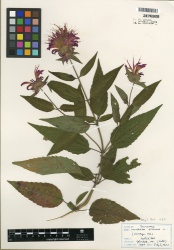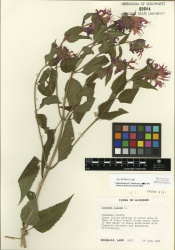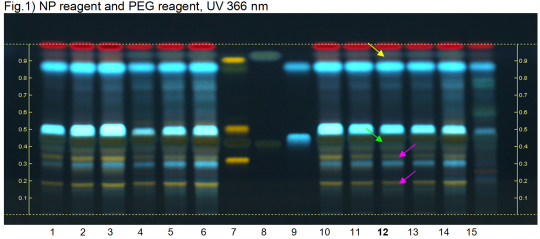Monarda didyma (leaf)
(Various title corrections, Source additions) |
(add askbox) |
||
| (3 intermediate revisions by one user not shown) | |||
| Line 1: | Line 1: | ||
| − | {{DISPLAYTITLE:''Monarda didyma'' (leaf) }} | + | {{DISPLAYTITLE:''Monarda didyma'' (leaf) }} {{askbox|herb=''Monarda didyma''}} |
=Nomenclature= | =Nomenclature= | ||
| Line 13: | Line 13: | ||
=Botanical Voucher Specimen= | =Botanical Voucher Specimen= | ||
| + | |||
| + | {{Media2 |cat=Voucher | ||
| + | |||
| + | | source=MOBOT, Tropicos.org | ||
| + | | mainimage=Monarda_didyma_Tropicos_100024136_(S).jpg | ||
| + | | companyimage=TropicosLogo.gif | ||
| + | | companyURL=http://www.tropicos.org/Image/100024136 | ||
| + | | reference=Tropicos.org. Missouri Botanical Garden. 26 Mar 2014 <http://www.tropicos.org/Image/100024136> | ||
| + | |||
| + | | source2=MOBOT, Tropicos.org | ||
| + | | image2=Monarda_didyma_Tropicos_100024533.jpg | ||
| + | | companyimage2=TropicosLogo.gif | ||
| + | | companyURL2=http://www.tropicos.org/Image/100024533 | ||
| + | | reference=Tropicos.org. Missouri Botanical Garden. 26 Mar 2014 <http://www.tropicos.org/Image/100024533> | ||
| + | |||
| + | |||
| + | | }} | ||
| + | |||
| + | |||
=Organoleptic Characteristics= | =Organoleptic Characteristics= | ||
Latest revision as of 20:38, 2 June 2014
Contents |
Nomenclature
Monarda didyma L. Lamiaceae
Standardized common name (English): Oswego tea
Botanical Voucher Specimen
|
|
|
Organoleptic Characteristics
Macroscopic Characteristics
Microscopic Characteristics
High Performance Thin Layer Chromatographic Identification
|
Oswego tea (leaf) (Monarda didyma) Lane Assignments Lanes, from left to right (Track, Volume, Sample):
Reference Sample(s) Reference: Individually dissolve 2 mg of rutin and 2 mg of hyperoside each in 10 mL of methanol. Optional: Individually dissolve 4 mg of quercetin, 1.5 mg of chlorogenic acid, 10 mg of naringin, 10 mg of naringenin and 10 mg of narirutin each in 10 mL of methanol. Dissolve 2 mg of rosmarinic acid in 10 mL of ethanol 50% (v/v). Stationary Phase Stationary phase, i.e. Silica gel 60, F254 Mobile Phase Anhydrous formic acid, water, methyl ethyl ketone, ethyl acetate 10:10:30:50 (v/v/v/v) Sample Preparation Method Sample: Mix 500 mg of powdered sample with 5 mL of methanol and sonicate for 10 minutes, then centrifuge or filter the solutions and use the supernatants / filtrates as test solutions. Derivatization reagent: 1.) NP reagent, Preparation: 1 g of natural products reagent in 200 mL of ethyl acetate; 2.) PEG reagent, Preparation: 10 g of polyethylene glycol 400 in 200 mL of dichloromethane, Use: Heat plate for 3 min at 100°C, then dip (time 0, speed 5) in NP reagent, dry and dip (time 0, speed 5) in PEG reagent. Detection Method No detection. Other Notes Images presented in this entry are examples and are not intended to be used as basis for setting specifications for quality control purposes. System suitability test: Rutin: orange fluorescent zone at Rf ~ 0.32 (UV 366 nm). Hyperoside: orange fluorescent zone at Rf ~ 0.50 (UV 366 nm). Identification: Compare result under UV 366 nm with reference images. The fingerprint of the test solution is similar to that of the corresponding botanical reference sample. Additional weak zones may be present. The chromatogram of the test solution shows an intense light blue zone at Rf ~ 0.50 corresponding in position to reference hyperosid and at Rf ~ 0.87 corresponding to reference rosmarinic acid. Faint brownish-yellow zones are seen slightly above the position of rutin and at Rf ~ 0.18 (pink arrows). A greenish grey zone is seen at Rf ~ 0.46 corresponding to the position of reference naringin. Close to the solvent front a red zone is seen. Just below it there is greenish grey zone corresponding to reference substance naringenin (yellow arrow). Test for other plant parts: Under white RT no red zone is seen at Rf~ 0.25 (black arrow, Oswego tea flower). Source: HPTLC Association [3] |
Supplementary Information
Sources
- ↑ MOBOT, Tropicos.org http://www.tropicos.org/Image/100024136
- ↑ MOBOT, Tropicos.org http://www.tropicos.org/Image/100024533
- ↑ HPTLC Association http://www.hptlc-association.org/




